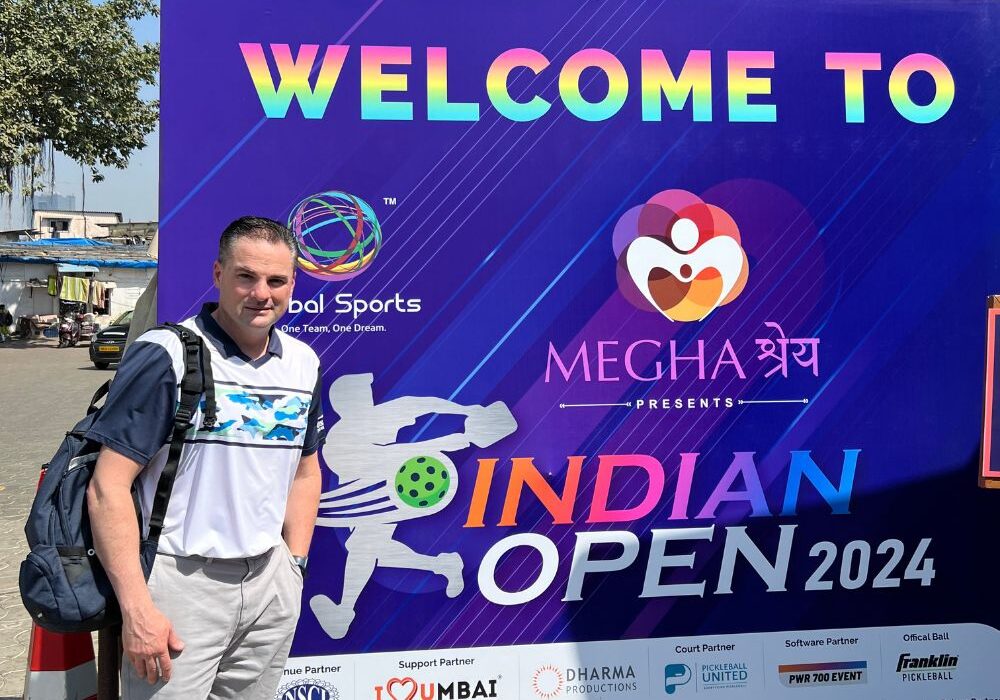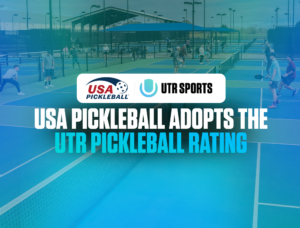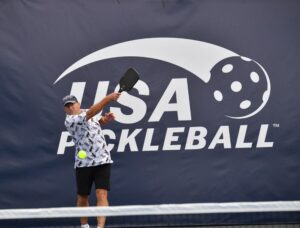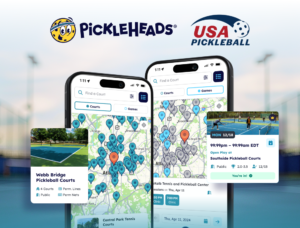USAP COO Justin Maloof Represented USA Pickleball At the Indian Open
The trip was an opportunity to witness a premier Asian event while also sharing U.S. know-how.
Over the past few years, pickleball has entrenched itself as the fastest-growing sport in the United States. Between Feb. 8 and 11, USA Pickleball Chief Operating Officer Justin Maloof represented the organization at the 2024 Indian Open, a tournament with $100,000 in prize money, at the National Sports Club of India in Mumbai.
“I’m really looking forward to it,” Maloof said of his excursion to India. “It certainly demonstrates just the growth of the sport, the fact it’s being played now internationally. (The sport) has got a ways to go to catch up to where we are here in the U.S., but this is the first major tournament (in India), certainly the largest cash prize, $100,000, and they’ve got some pretty big sponsors. It’s just exciting to see, and I’m really looking forward to seeing it firsthand.”
Pickleball was introduced in India in the late 2000s, but the sport has especially taken off over the past few years due to the COVID-19 pandemic when people were seeking ways to remain physically active that would also allow them to remain socially distanced. Pickleball proved to be the perfect sport.
Though the total number of players in India is unclear, Maloof noted that the country is part of the Asian Pickleball Federation and has been building up sponsorships.
“That will certainly help foster additional growth,” he said.
A sports industry veteran, Maloof has been with USA Pickleball since 2013, when he was hired as the organization’s first full-time employee. And this isn’t his first international trip to promote the sport. In 2018, he was part of a USA Pickleball goodwill visit to China to introduce pickleball to a country with a population of over 1 billion, a staggering number which properly illustrates China’s immense growth potential. While in China, they attended a sports expo at a university in Shenzhen and presented about pickleball.
“We did demos and a nationwide podcast talking about the sport,” he said. “We went to various venues, which at the time were badminton venues, but they were just introducing pickleball at these venues. So, we were able to go in and do some demos, youth clinics. That was pretty exciting.”
Since that trip to China, pickleball has taken off there and continues to see exponential growth. Maloof said the Chinese government is poised to undertake a full effort to grow the sport, including an infusion of resources aimed to fuel further expansion.
“I anticipate that in terms of participation and talent, they are going to probably get to where we are (in the U.S.) real quick,” he said.
Trips like his previous one to China and this one to India to witness firsthand one of the marquee events of Asian pickleball not only have showed Maloof and USA Pickleball how other parts of the world conduct their tournaments, but the trips also present a great opportunity to pass along all that the U.S. officials have learned about the sport during its immense growth period here.
“I think the sport there is several years behind where the U.S. is right now, but I think with our efforts to help foster growth internationally, I don’t think it’s going to take 10, 15 years for these countries to catch up,” Maloof said.
“We’ve got not only the rules, but we’ve got the officiating programs, the ambassador programs, we’ve got the tournament resources, we have the roadmap, if you will, based on the efforts that we’ve undertaken and have kind of experimented with, have an idea of what works and what doesn’t. The opportunity to share those resources and those how-to’s on an international level, that’s certainly going to help these countries get to where the U.S. is today much quicker.”
And Maloof admits he envisions a time when pickleball is an Olympic sport and occupying a high-profile space on the international stage. That will have to wait until more the sport picks up in more countries, he said.
At the moment, roughly 80 countries support the game, Maloof said. “And that’s great,” he added, “but right now most of those are just (in the phase with) the initial clubs within those countries.
“Our immediate goals are grassroots initiatives. It’s about building the base. We’ve got to get more people playing the sport. We’ve got a ways to go. It is a matter of fostering more growth internationally, getting more people playing and strengthening those national federations.”
Stephen Hunt is an accomplished freelance writer and sports statistician who has been blessed to cover a multitude of subjects and sports in his time. He is a freelance contributor to USA Pickleball on behalf of Red Line Editorial, Inc.





